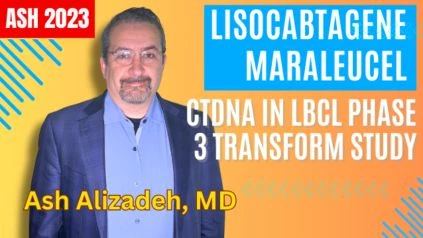By. Ash Alizadeh, MD
Date: 12/13/2023
At ASH 2023, Dr. Ash Alizadeh, a distinguished medical doctor and professor of medicine at Stanford University School of Medicine, shared captivating insights into the transformative landscape of lymphoma treatment during an interview.
The discussion centered around the pivotal TRANSFORM study, introducing Lysocabtagene maraleugel as a second-line therapy for large B cell lymphomas resistant to frontline treatments. Dr. Alizadeh eloquently elaborated on the trial’s resounding success, emphasizing its profound shift towards personalized therapies and the abandonment of traditional methods like high-dose chemotherapy and transplantation.
The interview seamlessly transitioned into a sub-study, exploring the role of circulating tumor DNA (ctDNA) in predicting outcomes. Dr. Alizadeh revealed that ctDNA levels correlated strongly with established disease measures, providing a non-invasive and profound tool for assessing disease burden.
Insightful questions probed into risk stratification and personalized treatment approaches based on pretreatment ctDNA levels. Dr. Alizadeh acknowledged the need for further analysis but stressed the profound significance of ctDNA as a quantitative and holistic measure.
A critical aspect explored was the prognostic significance of residual ctDNA, even in cases with seemingly complete responses. The potential of ctDNA to identify patients at high risk of disease progression, despite negative imaging results, opened profound avenues for redefining post-treatment surveillance and decision-making strategies.
Closing the interview, Dr. Alizadeh acknowledged the evolving and profound landscape of incorporating ctDNA monitoring into routine clinical practice. Ongoing discussions and profound proposals indicated a promising shift in how the medical community approaches lymphoma treatment and surveillance, marking a profound advancement in patient care for large B cell lymphoma.

